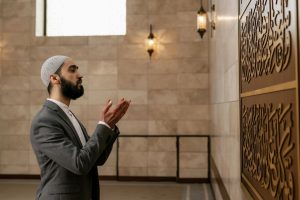WHY DO WE CELEBRATE EID UL-ADAH?

Eid ul-Adha, formally known as The Festival of Sacrifice, stands as one of the most important and spiritually significant events in the Islamic calendar. Observed by Muslims across the globe, it is a time for prayer, reflection, generosity, and unity. As we approach Eid ul-Adha 2025, it’s essential to revisit the powerful story behind this sacred occasion and renew our understanding of its deeper meaning.
THE STORY BEHIND EID UL-ADHA
While many associate Eid ul-Adha with festivity and family gatherings, its roots lie in an extraordinary story of unwavering faith and obedience.
Thousands of years ago, Prophet Ibrahim (AS) also known as Abraham, the Friend of Allah (Khalilullah) was tested in a way that would define true submission to the will of Allah. After years of longing for a child, Allah (SWT) blessed him with a son, Ismail (AS), through his second wife, Hajar (RA).
When Ismail (AS) was old enough to walk alongside his father and assist him, Ibrahim (AS) saw a dream, in which Allah commanded him to sacrifice his beloved son. He received this dream for three consecutive nights, confirming it was a divine revelationWahy.
In the Qur’an, Allah (SWT) says:
Surah As-Saffat 37:102
“Then when (the son) reached the age to work with him, he said, ‘O my son, indeed I have seen in a dream that I [must] sacrifice you. So see what you think.’ He said, ‘O my father, do as you are commanded. You will find me, if Allah wills, of the steadfast.'”
Both father and son displayed unparalleled submission. As Ibrahim (AS) prepared for the sacrifice near Mina in present-day Saudi Arabia, Allah intervened:Surah As-Saffat 37:104–107
“We called out to him, ‘O Ibrahim! You have fulfilled the vision.’ Indeed, We thus reward the doers of good. This was truly a revealing test. And We ransomed him with a great sacrifice.”
A ram from Paradise was provided in place of Ismail (AS), signifying that Allah valued obedience over the act itself.
This profound moment became the cornerstone of Eid ul-Adha—a celebration of faith, sacrifice, and submission to Allah’s will.
REFLECTING ON THE MEANING OF SACRIFICE
The story of Prophet Ibrahim (AS) prompts each of us to reflect: What are we willing to give up for the sake of Allah? Is it our wealth, our comforts, our attachments? Whether it’s a luxury car, a cherished possession, or worldly aspirations, nothing should outweigh our devotion to Allah.
Children, too, are a test, and as parents or guardians, our duty is to raise them in righteousness while never losing sight of our own spiritual journey. Our hearts must remain tethered to the Creator, not creation.
WHEN IS EID UL-ADHA 2025?
Eid ul-Adha 2025 is expected to begin on the evening of Friday, June 6, 2025, and conclude on Tuesday, June 10, 2025, subject to moon sighting. It falls on the 10th day of Dhul Hijjah, the final month of the Islamic calendar, and aligns with the conclusion of Hajj, the sacred pilgrimage to Makkah.
Even for those not undertaking Hajj, Eid ul-Adha holds immense merit and should be marked with both spiritual devotion and community engagement.
HOW IS EID UL-ADHA CELEBRATED?
Eid ul-Adha is observed through a combination of worship, sacrifice, and generosity:
Eid Salah: The day begins with a special congregational prayer, held in mosques and open fields. Before attending, it is Sunnah to bathe, wear one’s best clothes, apply fragrance, and eat a light meal—preferably dates.
The Takbir: From the Fajr of the 9th Dhul Hijjah to Asr of the 13th, Muslims recite the Takbir:
“Allahu Akbar, Allahu Akbar, La ilaha illallahu Wallahu Akbar, Allahu Akbar wa lillahil-hamd.”
Qurbani (Sacrifice): Those who are financially able offer a sacrifice of livestock—goat, sheep, cow, or camel—in remembrance of Ibrahim’s test. The meat is divided:
One-third for the family,
One-third for relatives and friends,
One-third for those in need.
Charity and Community: Many use this occasion to give Sadaqah, visit loved ones, and share meals. Children are gifted new clothes and presents. It is a time of joy, but also of empathy and outreach.
A DU’A FOR EID UL-ADHA
Eid is not only a time for celebration but also deep spiritual connection. In addition to the Takbir, Muslims are encouraged to make heartfelt du’as, asking Allah for:
Forgiveness of sins,
Guidance in life,
Peace and prosperity for the entire Ummah.
This is a time to reset spiritually, thank Allah for His blessings, and extend those blessings to others through acts of kindness.
WHY WE CELEBRATE EID UL-ADHA
Eid ul-Adha is not simply a religious obligation—it is a reaffirmation of our faith. It teaches us:
To submit wholeheartedly to Allah,
To let go of worldly attachments,
To care for the poor and uplift the needy.
Your Qurbani is not just a ritual—it is a means to feed the hungry, empower communities, and bring joy to those in hardship. Through sacrifice and generosity, Eid ul-Adha transforms lives—both ours and those we help.
LOOKING AHEAD TO EID UL-ADHA 2025
As we prepare for Eid ul-Adha 2025, let us do so with intention, knowledge, and compassion. May this sacred time serve as a reminder to live with purpose, give with sincerity, and worship with humility.
From all of us at 3SixtyIslam, Eid Mubarak. May your celebrations be filled with faith, peace, and joy—and may your sacrifices be accepted by Allah (SWT).

